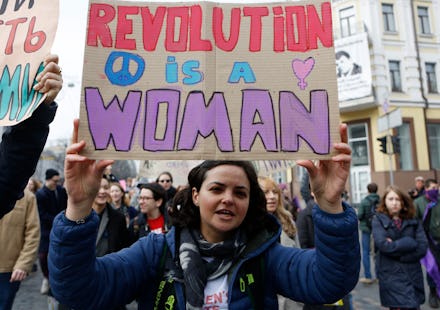Participants in the 'Day without a Woman' are privileged. So what?

Today, millions of women and their allies in cities around the world will participate in A Day Without A Woman, a strike for "equity, justice, and the human rights of women and all gender-oppressed people." Held on International Women's Day and organized by the leaders of the Jan. 21 Women's March on Washington — a motley crew of immigrants, women of color, lesbians and trans women from a variety of class backgrounds — it has been described as a "mobilization of the 99%."
But reading the recent spate of editorials about the the strike, you'd think it was the brainchild of Meryl Streep and Facebook chief operating officer Sheryl Sandberg.
"Make no mistake," wrote Meghan Daum in the Los Angeles Times, "March 8 will mostly be a day without women who can afford to skip work" and "shuffle childcare and household duties to someone else." Maureen Shaw joined the choir of concern-trolling in a recent essay, asking, "As a mother whose husband works long hours away from home, how am I supposed to stop taking care of my very young children?"
It's certainly true that it will be easier for privileged women to join in the strike, and nerve-wracking for those who need their jobs to risk losing them. The organizers of the March 8 strike have acknowledged as much, writing, "Many women in our most vulnerable communities will not have the ability to join the strike, due to economic insecurity. We strike for them."
You can't help being privileged; you can help what you do with it.
But even if it's true that only privileged women could afford to participate, so what? That is precisely how strikes work: Individuals who stand to lose take calculated risks in hopes of securing long-term gains for the group at large. The more participation from others — including those who, for whatever reason, can afford to take time off of work — the better the result.
It's great to be aware of privilege — who has it, who doesn't, and how we can use different forms of it to expand social justice for everyone. But the fact that some actions are easier for privileged people to undertake is not a sufficient basis for discrediting or dismissing them. You can't help being privileged; you can help what you do with it.
It's telling that those on the right are as enamored of the "you're too privileged to protest" argument as the left. Conservative blogger Erick Erickson wrote, "What we are going to witness with this strike is an overwhelming show of privilege."
It's not clear what these critics want. For the strike to be canceled? For its organizers to destroy capitalism so that everyone is free to participate without fear of economic reprisal? Without offering solutions — in fairness, Shaw did suggest handing out fact sheets instead — these critiques do little but undermine and discredit the legitimacy of protest.
The most successful protests are led by the targets of certain policies and strengthened by others (aka, those with more privilege). In 1969, a group of poor, black, female hospital workers in Charleston, South Carolina, went on strike. As Coretta Scott King noted when she came to support them, female hospital workers tended to be "the main supporters of their families." Those women needed their jobs. But they decided they needed their dignity more. They succeeded in getting 12 fired workers reinstated; raising their pay to the federal level; and establishing a credit union and a formal grievance procedure.
Much of the Charleston strike's success was due to solidarity. Union organizers and members traveled from as far away as New York City to join the fight. National civil rights leaders like King showed up to march. The Southern Christian Leadership Conference sent student organizers. It was a powerful show of unity, the opposite of the demobilizing cynicism and sanctimonious contempt essays like Daum's, Shaw's and Erickson's breed.
I don't know exactly what the March 8 strike will achieve. I am joining the strike out of solidarity and to affirm my commitment to social and economic justice. Visibility matters. History shows us that women-led strikes and marches have yielded important gains for the labor movement, the civil rights movement, the peace movement and the women's movement. Rather than wagging fingers at privilege, I hope many will join us in using theirs.